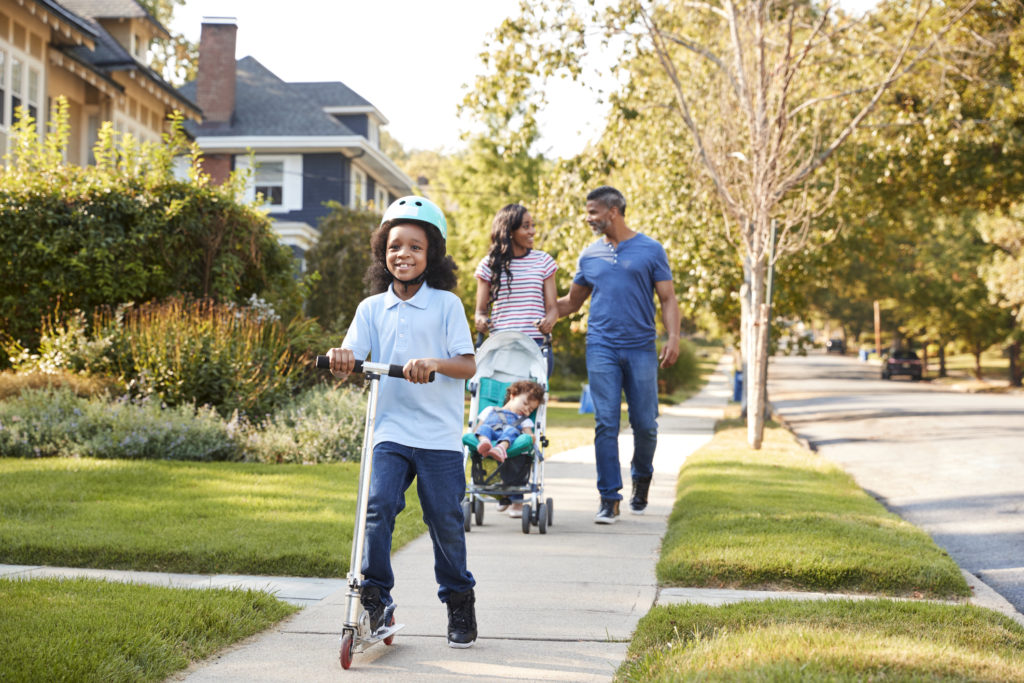Opinion: Building Sustainable Neighborhoods Takes Community

Photo: istock
Local And Green
This column appeared previously in the Amherst Bulletin.

In my life, entire years have passed without a conversation with my neighbors. As a teacher and single mom, I would come home from work, pick up kids, drive into the garage, walk directly into the house, make dinner, clean up, focus on homework and getting ready for bed, and then, after kids were in bed, do my homework for teaching.
The kids in my neighborhood didn’t play with each other after school or even on the weekends because they were all scheduled up with activities and didn’t have free time in common. So I didn’t form strong bonds with my neighbors, and my kids didn’t form strong bonds with neighborhood kids.
It seemed like there wasn’t time to talk to neighbors about our common lives, much less to talk about the state of the world.
This is not just Amherst. It’s a national trend. Though our busy lives seem to be a barrier to building community in our neighborhoods, there are ways it can be done, given a little leadership and effort. I think we all want happy neighborhoods where adults hang out in front yards or on front porches and kids play together — and where folks come together to work on common interests, like providing support for local schools and for making our neighborhoods sustainable, diverse and family friendly.
And creating sustainability in our neighborhoods can bond us even further, providing a sense of a common mission for residents throughout the town.
Here are some ways to build community and sustainability in your neighborhood.
Getting to know your neighbors is the key — by being outside and introducing yourself. If you are in an apartment or condo complex, a good place to meet is at the community room, the recycle bins, mailboxes, playground or pool. A few neighbors could form a welcoming committee to provide information about the neighborhood to new families.
Neighbors could organize kid-friendly activities, like playgroups, grown up activities, like happy hour bonfires, open mic nights, or book clubs, and regular neighborhood events for the whole family, like block parties, movie nights, or porch concerts.
Some of these ideas are being thrown around in the Orchard Valley neighborhood, where we already have some regular events including a spring plant swap, a July open mic, an August potluck (with open-mic this year!), a stellar Halloween trick or treat extravaganza, a Markert’s Pond fall clean up, and a winter holiday tree decorating event at Markert’s Pond.
Ideas to create a more sustainable neighborhood are also great for bringing people together and creating resilience. People in Amherst are aware of climate change and the need to conserve resources so it’s not a hard sell.
There are quite a few strategies you could use to create a more sustainable neighborhood. One of the easiest to start with is to create neighborhood walking tours to showcase sustainable practices that your neighbors are already undertaking.
You could have a sustainable garden tour — to learn about pollinator gardens, planting native species and how to get rid of your lawn.
You could have a transportation tour where you hear from electric car and truck owners, bicyclists, bus riders and car poolers.
You could have a general sustainable home and yard tour. Who in your neighborhood has solar panels, an air source or ground source heat pump, a heat pump hot water heater, an induction stove, or highly rated windows? Who is using rain barrels to conserve water?
You could have a zero waste tour, providing tips on composting, recycling different hard to recycle materials, repairing and reusing items rather than throwing them away.
Community projects also bring a sense of belonging, like creating a community garden, planting trees, or sponsoring a neighborhood zero waste yard sale.
As noted in my last column, Zero Waste Amherst is organizing Sustainable Neighborhood Teams that we hope will do door-to-door outreach to provide information about upcoming town programs, like the adoption of curbside compost pick up, the opportunity to get discounts for heat pumps, the benefits of retrofitting your home or buying an electric vehicle and about town campaigns aimed at getting everybody on board.
It’s true that not everyone has the time to spearhead these efforts. But a little organizing work can go a long way. Regular events can be the most successful in bringing neighbors together. Maybe you can be the one to take the first step to organize a neighborhood event. And consider working with other neighbors on a Sustainable Neighborhood Team. We need you to help strengthen our neighborhood bonds.
Darcy DuMont is a founding member of Zero Waste Amherst and of Local Energy Advocates of Western MA. As a Town Councilor, she sponsored the legislation creating the Amherst Energy and Climate Action Committee.
